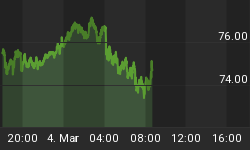Contained, they said. No spillover from the financial collapse, they said. The consumer is resilient and will continue spending, they said. Who are "they" you ask? The politicians, bankers, Fed speakers, analysts, brokers, economists and talking heads on the financial and - of late - mainstream media. All out there telling you its going to be okay, that the sweet life will roll on for just about everyone.
Why do they do this, why do they want you to believe that life will always be sweet? Simple. You have to continue to spend rather than save to keep the circle of money and credit viable. If confidence evaporates then spending stops as consumers begin to act in a discretionary manner, hoarding cash to buffer against the possible "unexpected" hard times. You can see the political advantages that accrue if you can say the hard times are due to an unexpected event. You don't get the blame and the public accept the medicine required to alleviate the situation.
Everyone is focused on housing. All well and good but, without sounding dismissive, it's built into the scenario now. We know foreclosures are rising and will more than likely will continue to rise. We know what effect that had on the pricing and rating of CDOs and MBS and the effect that had on CDS. The losses may well continue to rise, by huge amounts but.....we know. The focus has been upon the contained area, the Colosseum in which the blood would be spilt. We have been diverted from watching events elsewhere, beyond the blood sodden sand of the Circus Maxed-outus.
Not anymore. No we have definitive proof that it isn't just housing that is suffering the blows of the Gladius. After the promises come the facts. That second largest purchase, the automobile, is entering the arena and it's already wounded from previous contests.
Enough of my similes. Lets look at the automobile industry in the US.
Friday saw the release of the sales figures for the US domestic automobile market. Ugly would be a kind description. I want to use the January y-o-y figures to show just how hideous the economy is becoming. It's not just domestic manufacturing that's suffering. Importers (i.e. Japan and the Far East) are selling less in the US marketplace.
Firstly let's look at the raw January y-o-y figures:
Ford Motor Co. reported Friday its U.S. light vehicle sales fell 3.9% in January.
In January, GM North America produced sales fell 5% in January.
American Honda Motor Co. Friday said its sales in January fell 2.3%.
Toyota Motor Sales U.S.A. Inc. said Friday its U.S. sales fell 2.3% in January.
Nissan Motor Co.'s Nissan North America Inc. division reported total sales in January fell 7.3%.
Porsche Cars North America Inc. said Friday its January U.S. sales fell 13%.
Kia Motors America on Friday reported January U.S. sales of 21,355 units, down 5.2%.
American Suzuki Motor Corp. said Friday its U.S. auto sales fell 13% in January.
Hyundai Motor America said January sales fell 23%.
Mercedes-Benz USA said Friday its U.S. sales rose 7.1% in January.
Mazda North American Operations said Friday sales in January rose 10.2%.
The last 2, Mercedes and Mazda, look healthy but both rises are on relatively small volumes as we shall see. Similarly Porsche and Suzuki figures are on small volume too. All the large volume producers lost sales volume. I am not overly interested in truck v car v SUV sales. I am looking at volume not choice.
Total sales for January vs January '07 were:
Ford - 159,355 down from 165,877
GM - 297,000 down from 313,000
Honda - 98,511 down from 100,790
Toyota - 171,849 down from 175,850
Nissan - 76,605 down from 82,644
Hyundai - 21,452 down from 27,721
Kia - 21,355 down from 22,465*
(*Approx)
According to AutoData Corp, overall car sales fell last month to a seasonally-adjusted annual rate of 15.2 million vehicles. That's the weakest pace since the ending of heavy discounts at dealerships in late 2005.
Without doubt sales of the second biggest purchase made by the US consumer have plummeted y-o-y. If the US consumer is now withdrawing from big ticket purchases (including Porsches) then not only will manufacturing head into a deeper recession but the service industry will also see a reduction in income. Discretionary spending, reliant for so long on the continued use of credit, is grinding to a halt.
Let's have a look at some possible opportunities. I remind readers, I am not recommending any positions in any instruments. All I wish to do is point out the possible areas that may be affected.
Here is the DJ US Auto Index from Bigcharts:
To read the rest of this article, click here.
















